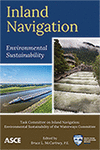Chapter 2
Environmental Sustainability
Publication: Inland Navigation: Environmental Sustainability
Abstract
The earliest navigation projects were designed and constructed with minimal regard for depletion or destruction of natural resources. Projects were often of too modest a scale for large environmental impacts, and science was inadequate to define any but the most catastrophic effects. The US Army Corps of Engineers has established a set of environmental operating principles to ensure that its mission includes totally integrated sustainable environmental practices. These principles must be implemented through Corps’ regulations and manuals in order to become embedded in practice and achieve a standing comparable to economic issues. In addition to laws, regulations, and policies, the principles of sustainable development have now been incorporated into codes of ethics. ASCE, with the American Public Works Association (APWA) and the American Council of Engineering Companies (ACEC), has established the Envision infrastructure sustainability rating system within a new Institute for Sustainable Infrastructure for horizontal infrastructure service systems.
Get full access to this article
View all available purchase options and get full access to this chapter.
References
ACOPNE (Academy of Coastal, Ocean, Port and Navigation Engineers). 2015. Navigation engineering body of knowledge. Accessed November 10, 2015. https://www.acopne.org/certification-certification-exam/navigation-body-knowledge-bok.
ASCE. 1998. Sustainability criteria for water resource systems: ASCE task committee on sustainability criteria. New York: ASCE.
ASCE. 2016. Policy statement 418: The role of the civil engineer in sustainable development. Accessed August 21, 2017. https://www.asce.org/issues-and-advocacy/public-policy/policy-statement-418---the-role-of-the-civil-engineer-in-sustainable-development/.
ASCE. 2017. Code of ethics. Accessed August 21, 2017. https://www.asce.org/code-of-ethics/.
Carson, R. 1962. Silent spring. New York: Houghton-Mifflin.
Casavant, J. 2000. “Inland waterborne transportation—An industry under siege.” In Agricultural transportation challenges of the 21st century. Washington, DC: US Dept. of Agriculture.
ISI (Institute for Sustainable Infrastructure). 2017. Envision sustainable infrastructure rating system. Accessed August 23, 2017. https://sustainableinfrastructure.org/envision/.
McAnally, W. H., Y. Zhang, A. J. Allen, R. O. Bowden, and A. Tan. 2004. Transportation responses to increased Latin American trade. Starksville, MS: National Center for International Transportation.
USACE. 1980. Layout and design of shallow-draft waterways. EM 1110-2-1611. Washington, DC: USACE.
USACE. 2017. USACE reinvigorates environmental operating principles. Accessed August 23, 2017. https://www.usace.army.mil/Missions/Environmental/Environmental-Operating-Principles.
USC (United States Code). 1899. 33 United States Code 403. Washington, DC: Government Printing Office.
Information & Authors
Information
Published In
Copyright
© 2019 American Society of Civil Engineers.
History
Published online: Jan 10, 2019
ASCE Technical Topics:
Authors
Metrics & Citations
Metrics
Citations
Download citation
If you have the appropriate software installed, you can download article citation data to the citation manager of your choice. Simply select your manager software from the list below and click Download.
